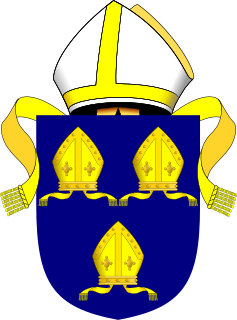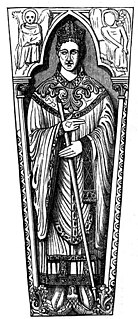Related Research Articles
William of Wykeham was Bishop of Winchester and Chancellor of England. He founded New College, Oxford, and New College School in 1379, and founded Winchester College in 1382. He was also the clerk of works when much of Windsor Castle was built.

Richard Poore or Poor was a medieval English bishop best known for his role in the establishment of Salisbury Cathedral and the City of Salisbury, moved from the nearby fortress of Old Sarum. He served as Bishop of Chichester, Bishop of Salisbury and Bishop of Durham.
Nicholas of Ely was Lord Chancellor of England, Bishop of Worcester, Bishop of Winchester, and Lord High Treasurer in the 13th century.
John Langton was a chancellor of England and Bishop of Chichester.

William Greenfield served as both the Lord Chancellor of England and the Archbishop of York. He was also known as William of Greenfield.

The Bishop of Norwich is the ordinary of the Church of England Diocese of Norwich in the Province of Canterbury. The diocese covers most of the county of Norfolk and part of Suffolk. The bishop of Norwich is Graham Usher.

Gisa was Bishop of Wells from 1060 to 1088. A native of Lorraine, Gisa came to England as a chaplain to King Edward the Confessor. After his appointment to Wells, he travelled to Rome rather than be consecrated by Stigand, the Archbishop of Canterbury. As bishop, Gisa added buildings to his cathedral, introduced new saints to his diocese, and instituted the office of archdeacon in his diocese. After the Norman Conquest, Gisa took part in the consecration of Lanfranc, the new Archbishop of Canterbury, and attended Lanfranc's church councils. His tomb in Wells Cathedral was opened in the 20th century and a cross was discovered in his tomb.

Walter de Cantilupe was a medieval Bishop of Worcester.
John of Thoresby was an English clergyman and politician, who was Bishop of St David's, then Bishop of Worcester and finally Archbishop of York. He was Lord Chancellor of England under King Edward III starting from 1349.
Henry Ware was a medieval clergyman who became a diplomat and Lord Privy Seal for King Henry V of England from 1416 to 1418. He later became the Bishop of Chichester. Originally from Wales, Ware served as a canon from the 1390s and then studied law, of which he was made a master, at Oxford University. He later became an official in the court at Canterbury. He also spent some time in diplomatic missions to France. In early 1418 he was elected bishop of Chichester, and was consecrated in July 1418. He died in July 1420, between the 7th and the 26th.

The archbishop of York is a senior bishop in the Church of England, second only to the archbishop of Canterbury. The archbishop is the diocesan bishop of the Diocese of York and the metropolitan bishop of the Province of York, which covers the northern regions of England as well as the Isle of Man. The archbishop of York is an ex officio member of the House of Lords and is styled Primate of England; the archbishop of Canterbury is the Primate of All England.
Thomas Brunce was a 15th-century Bishop of Rochester and then Bishop of Norwich.

The Bishop of Worcester is the head of the Church of England Diocese of Worcester in the Province of Canterbury, England.

Simon of Apulia was an Italian-born canon lawyer who served as Bishop of Exeter in Devon, England, from 1214 until his death in 1223.

John Barnet was a Bishop of Worcester then Bishop of Bath and Wells then finally Bishop of Ely.
Seffrid I, sometimes known as Seffrid Pelochin, was a medieval Bishop of Chichester.
Stephen Bersted was a medieval Bishop of Chichester.

William Reade was a medieval Bishop of Chichester.
John RickingaleD.D. also known as John de Rickingale was a medieval Bishop of Chichester, Master of Gonville Hall, Cambridge, Chancellor of the University of Cambridge and Chancellor of York Minster.
Robert Warelwast was a medieval Bishop of Exeter.
References
- Coleman, Janet (1985). Piero Boitani (ed.). Chaucer and the Italian Trecento: English Culture in the Fourteenth Century. Cambridge: Cambridge University Press. ISBN 9780521239981.
- Fryde, E. B.; Greenway, D. E.; Porter, S.; Roy, I. (1996). Handbook of British Chronology (Third revised ed.). Cambridge: Cambridge University Press. ISBN 0-521-56350-X.
- Stephens W.R.W. (1876). Memorials of the South Saxon See and Cathedral Church of Chichester. London: Richard Bentley and Sons.